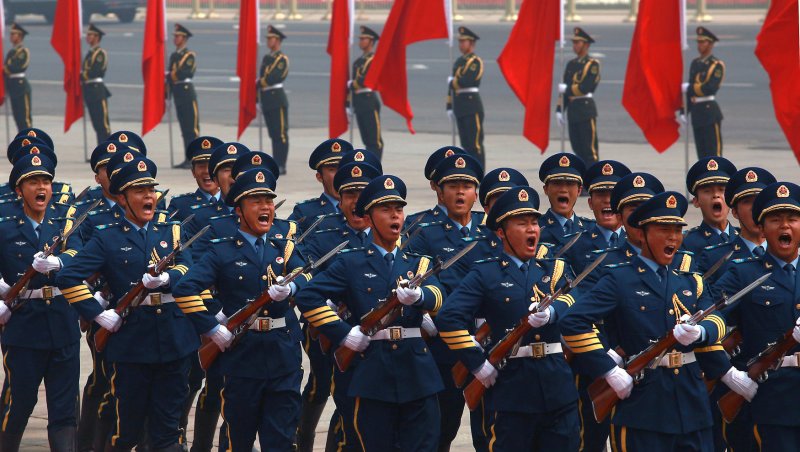Chinese soldiers perform honor guard duties during Palestinian President Mahmoud Abbas's state visit in Beijing on May 6, 2013. UPI/Stephen shaver |
License Photo
WASHINGTON, May 7 (UPI) -- China has stepped up its military modernization program and is building space and cyberspace capabilities, a U.S. Defense Department report says.
The assessment is in the Pentagon's annual report to the U.S. Congress on military and security developments in China.
It deals with China's security and military strategies; developments in China's military doctrine, force structure and advanced technologies; U.S.-China military-to-military contacts and the U.S. strategy for such engagement; and the nature of China's cyber activities directed against the Defense Department, the department reported on its website.
David Helvey, deputy assistant secretary of Defense for East Asia, said trends in this year's report show China increasing its military modernization program under the country's new leadership led by President Xi Jinping.
"We see a good deal of continuity in terms of the modernization priorities," Helvey said. He cited China's launch of its first aircraft carrier last year and sustaining investments in advanced short- and medium-range conventional ballistic missiles, land-attack and anti-ship cruise missiles, counter-space weapons and military cyberspace systems.
"The issue here is not one particular weapons system," he said. "It's the integration and overlapping nature of these weapons systems into a regime that can potentially impede or restrict free military operations in the Western Pacific. So that's something that we monitor and are concerned about."
Helvey said China last year conducted 18 space launches and expanded its space-based intelligence, surveillance, reconnaissance, navigation, meteorological and communication satellite constellations.
"At the same time, China continues to invest in a multidimensional program to deny others access to and use of space," Helvey said.
He said the Chinese army continues to develop doctrine, training and exercises that emphasize information technology and operations.
"In addition, in 2012, numerous computer systems around the world, including those owned by the United States government, continued to be targeted for intrusions, some of which appear to be attributable directly to [Chinese] government and military organizations," he said.
He said China has "increased assertiveness with respect to its maritime territorial claims" over the past year, such as those with Japan over the Senkaku Islands in the East China Sea and with neighbors in the South China Sea.















